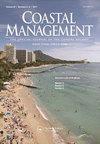沿海网络地图集的设计和评估:地图表示、交互和可用性的最佳实践和未来机会
IF 1.9
4区 环境科学与生态学
Q4 ENVIRONMENTAL SCIENCES
引用次数: 1
摘要
在本文中,我们研究了支持适应性管理的沿海网络地图集(CWAs)设计的最佳实践和未来机会。沿海地区面临着巨大的挑战,而CWAs已经成为一种组织地图和地理空间数据的资源,以支持有关沿海问题的教育、勘探和决策。我们的研究是由威斯康星海岸地图集(https://www.wicoastalatlas.net/)推动的,它是美国几个州的海岸地图集之一,是更广泛的国际海岸地图集网络(ICAN: https://ican.iode.org/)的成员。具体来说,我们进行了一项需求评估,将适应性海岸管理用户的需求与与cwa相关的交互式地图设计的三个原则联系起来:地图表示、交互和可用性。需求评估包括两个阶段:对10个州的CWA进行竞争性分析,并对来自这些州的利益相关者进行用户调查,了解他们对CWA设计的经验和意见。除了描述设计模式和价值之外,需求评估还确定了为今后的国别评估提供信息的重要差距,例如:纳入范围更广的专题地图;提供混合底图,提供有关海岸线的陆地和水域的背景;实施空间计算和时间排序以供分析和探索;使用故事地图来支持CWA的可学习性;改进了移动和非移动设备之间的响应能力;定制先进的分析工具,以支持对我们海岸面临的最紧迫问题的决策。本研究为沿海管理人员、规划人员、研究人员、教育工作者、外联专家和相关利益相关者提供服务,他们受益于可找到、可获取、可互操作和可重复使用(FAIR)的数据和有效的决策工具,以指导沿海资源的管理。本文章由计算机程序翻译,如有差异,请以英文原文为准。
Design and Evaluation of Coastal Web Atlases: Best Practices and Future Opportunities for Map Representation, Interaction, and Usability
Abstract In this article, we examine best practices and future opportunities for the design of coastal web atlases (CWAs) supporting adaptive management. Coastal zones face significant challenges, and CWAs have emerged as a resource to organize maps and geospatial data in support of education, exploration, and decision-making about coastal issues. Our research is motivated by the Wisconsin Coastal Atlas (https://www.wicoastalatlas.net/)—one of several U.S. state-based CWAs that are members of the broader International Coastal Atlas Network (ICAN: https://ican.iode.org/). Specifically, we conducted a needs assessment that bridges adaptive coastal management user needs with three tenets of interactive cartographic design relevant to CWAs: map representation, interaction, and usability. The needs assessment included two stages: a competitive analysis of 10 state CWAs and a user survey with stakeholders from those states about their experiences with and opinions on CWA design. In addition to characterizing design patterns and values, the needs assessment identified important gaps informing future CWAs, such as: inclusion of a wider range of thematic maps; provision of hybrid basemaps providing context about the land and water sides of the coastline; implementation of spatial calculations and temporal sequencing for analysis and exploration; use of story maps to support CWA learnability; improved responsiveness between mobile and non-mobile devices; and customization of advanced analytical tools that support decision making about the most pressing issues facing our coasts. This research serves coastal managers, planners, researchers, educators, outreach specialists, and related stakeholders who benefit from findable, accessible, interoperable, and reusable (FAIR) data and effective decision tools to guide management of coastal resources.
求助全文
通过发布文献求助,成功后即可免费获取论文全文。
去求助
来源期刊

Coastal Management
环境科学-环境科学
CiteScore
6.00
自引率
0.00%
发文量
24
审稿时长
>36 weeks
期刊介绍:
Coastal Management is an international peer-reviewed, applied research journal dedicated to exploring the technical, applied ecological, legal, political, social, and policy issues relating to the use of coastal and ocean resources and environments on a global scale. The journal presents timely information on management tools and techniques as well as recent findings from research and analysis that bear directly on management and policy. Findings must be grounded in the current peer reviewed literature and relevant studies. Articles must contain a clear and relevant management component. Preference is given to studies of interest to an international readership, but case studies are accepted if conclusions are derived from acceptable evaluative methods, reference to comparable cases, and related to peer reviewed studies.
 求助内容:
求助内容: 应助结果提醒方式:
应助结果提醒方式:


